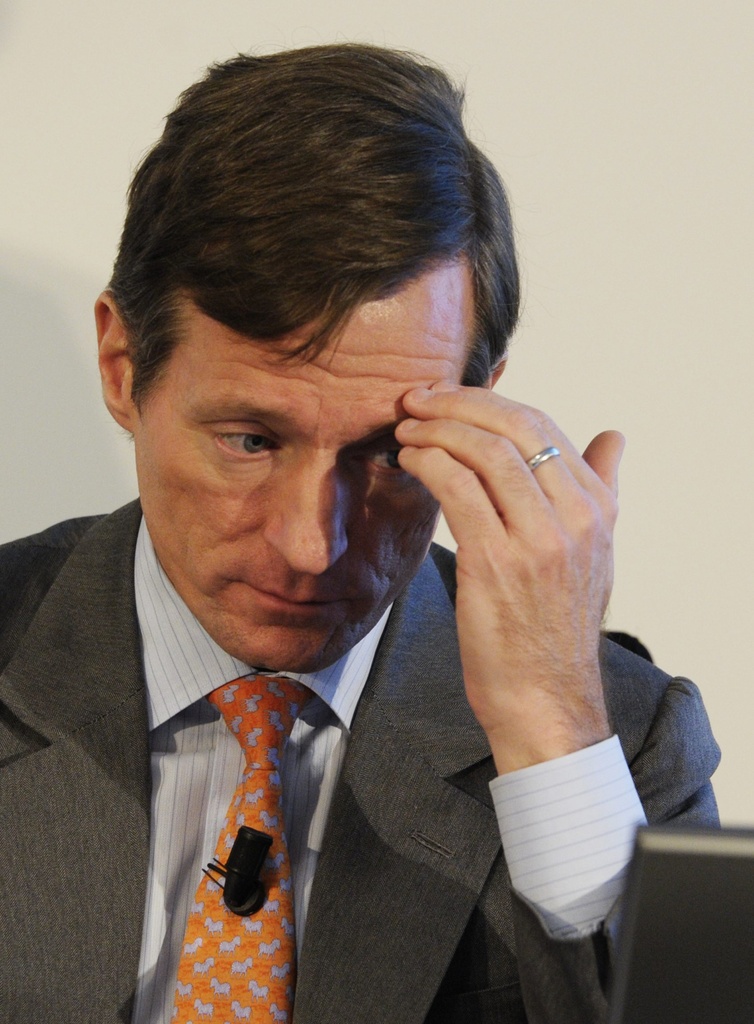Credit Suisse hands client data to US

Credit Suisse chief executive Brady Dougan has confirmed the bank has provided United States tax investigators with client data.
Speaking to shareholders at the bank’s annual general meeting in Zurich on Friday, Dougan said the bank had acted on the advice of the Swiss government.
“According to the recent decision of the Swiss [government], we provided the US authorities with information directly,” Dougan said, without disclosing the nature of the data handed over.
Credit Suisse is one of 11 banks under investigation by US tax authorities seeking information about offshore accounts held by US citizens intent on avoiding taxes.
Dougan’s admission came as Credit Suisse chairman Urs Rohner told shareholders the bank backs withholding tax deals agreed between Switzerland and Britain, Germany and Austria which are designed to ensure Swiss banks are clean of undeclared funds.
“It is simply a fact that a bank like Credit Suisse cannot and does not want to pursue a business model under which it attracts or accepts undeclared assets,” Rohner told the meeting.
Slim profit
Switzerland’s second-largest bank after UBS, Credit Suisse on Wednesday reported a net profit of SFr44 million ($48 million) which was well down from the SFr1.13 billion net profit it reported a year earlier but better than a forecast SFr436 million loss.
The result provided Dougan with some much-needed breathing space, with vocal detractors in recent months having accused him of not having scaled back the bank’s investment unit decisively enough.
The bank has announced staff cuts of 3,500, or about seven per cent of its workforce, with many of those to be lost from the faltering investment banking division.
“Credit Suisse’s improvement against what the market expected is largely due to the investment bank and fixed-income sales and trading, which dampens enthusiasm somewhat because it’s not what I see as sustainable long-term profits,” Bank Sarasin analyst Rainer Skierka told Reuters news agency.
Dougan told shareholders 2011 had been “a year of transition” for Credit Suisse.
“We took decisive steps in the second half of the year to further evolve our integrated bank model,” he said. “And we made significant progress in adapting the business to the new market and regulatory environment.”
“While these actions had a negative impact on our financial results, we are confident that adapting our business model will position us for improved profitability and more sustainable returns.”
Paying up, or down
As shareholders in big banks become more willing to flex their muscles over executive pay – shareholders of US bank Citigroup just last week rejected the bank’s executive pay plan – Credit Suisse did not escape unscathed.
A third of shareholders – 31 per cent – on Friday voted against the remuneration plan presented by the board, up from 23 per cent at last year’s meeting. This was despite Credit Suisse having slashed remuneration across the company.
Dougan, who saw his overall pay halved to SFr5.8 million compared with 2010, said he recognised the issue of compensation “can be a very controversial topic”.
He said variable compensation across the group was down 41 per cent in 2011 compared with 2010, while total variable compensation for members of the executive board was down 57 per cent.
“Our duty is to ensure that we pay for performance; what we pay our people must create value for our clients and shareholders,” he said.
Credit Suisse on April 25 reported a 95% drop in net profit to SFr44 million for the first quarter 2012.
But the result compared well with the fourth quarter of 2011 when the bank posted its first loss since 2008. Analysts had forecast a loss of up some SFr436 million for the quarter.
The bank attributed the reduced profit to writedowns of SFr1.6 billion related to the rising cost of its debt, and SFr534 million in bonds-related costs from derivatives handed out as part of 2011 bonuses for more than 5,500 bankers.
Fixed-income sales and trading boosted profit which was SFr1.355 billion without the debt effect.
Switzerland’s two big “universal” banks were both savaged by the financial crisis that started in 2008.
Credit Suisse got its fingers burned, but avoided the worst by spotting the warning signs earlier than its rival. UBS, on the other hand, became Europe’s worst hit bank, writing down more than $50 billion in losses. The group had to be bailed out by the government and the Swiss National Bank in 2008.
The fiasco led many Swiss politicians, the media and public to attack the banks’ plan of expanding investment banking operations in the build up to the crisis. Many observers have voiced concerns that traditional Swiss wealth management activities had been smothered by a new breed of aggressive Anglo-Saxon banking.
The government has demanded that UBS and Credit Suisse should hold enough capital to prevent them a failure that would drag down the economy. It wants to impose much tougher rules than the international standards.
The banks are concerned that if these rules are not extended to banks worldwide, they will become less competitive.

In compliance with the JTI standards
More: SWI swissinfo.ch certified by the Journalism Trust Initiative





You can find an overview of ongoing debates with our journalists here. Please join us!
If you want to start a conversation about a topic raised in this article or want to report factual errors, email us at english@swissinfo.ch.